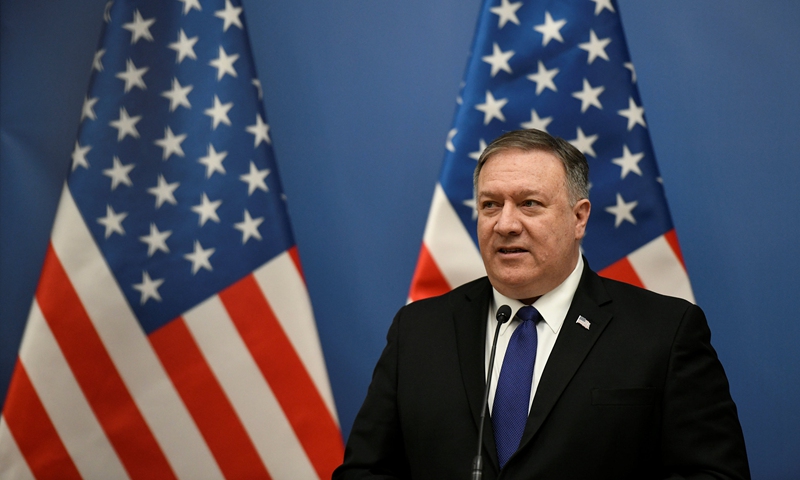
US Secretary of State Mike Pompeo. Photo: VCG
US Secretary of State Mike Pompeo seems to love attention as much as his boss, President Donald Trump. Pompeo is often seen making gaffes about different issues, but people laugh them off most of the time.
"I was the CIA director. We lied, we cheated, we stole… we had entire training courses," Pompeo said in Texas on April 15, 2019. The world considered the remarks an open confession from a former CIA boss about covert actions.
No criticism could stop him from making controversial comments, especially with regard to China. The Secretary of State has few equals when it comes to anti-China rhetoric, and some observers think he might be second only to Trump in slandering China.
As is his habit, Pompeo continues making controversial, sometimes insane, remarks against China even at the end of his tenure. However, the entire world was taken aback by his recent comments that "Taiwan is not a part of China." Pompeo made the remarks on a nationally syndicated US radio show on Thursday.
Pompeo's comment is completely against historical reality and truth. They are also a violation of international law and the charter of the United Nations. They are against the long-standing official stance of the US about its one-China policy. His remarks are a direct attack on his country's written commitments to China, based on which Sino-US ties have been established and still stand.
History testifies that the island of Taiwan is an inalienable part of China. The island is referred to as Taiwan Province in the constitution of the People's Republic of China. China owns the province based on its pre-1949 boundaries.
The world has also recognized that the island is an inseparable part of China. The United Nations (UN) has adopted a resolution to accept the legitimate claim of China over Taiwan. On October 25, 1971, the 26th session of the UN General Assembly passed Resolution No. 2,758. The resolution announced in clear and definite language that Taiwan is part of the People's Republic of China (PRC).
The UN General Assembly also recognizes that the representatives of the government of the PRC are the sole legal representatives of China in the UN and that the PRC is one of the permanent members of the UN Security Council.
On July 23, 2007, former UN secretary-general Ban Ki-moon rejected Taiwan's bid to "join the UN under the name of Taiwan," citing Resolution 2,758 as acknowledging that Taiwan is part of China. The UN is an international organization composed of sovereign states. Taiwan as a province of China is not qualified and has no right to participate in the global body.
Alongside the UN resolution, the US itself, in three Joint US-China Communiqués, has also acknowledged that all Chinese on either side of the Taiwan Strait maintain there is but one China and that Taiwan is a part of China. The US government attaches great importance to its relations with China and has reiterated that it has no intention of infringing on Chinese sovereignty and territorial integrity, or interfering in China's internal affairs, or pursuing a policy of "two Chinas" or "one China, one Taiwan."
International affairs observers and security analysts believe that Pompeo made his remarks on Taiwan mainly out of frustration over Trump losing the US election on November 3. He could see that the outcome of his anti-China diplomacy and trade frictions is that Americans have suffered a lot, and they voted against the incumbent regime in which he has been serving as the top diplomat.
That's why Pompeo is ridiculously venting his anger against China. But the remarks of the curent secretary of state make no sense and will definitely not influence the policy toward China of the incoming administration led by president-elect Joe Biden. Pompeo's Taiwan remarks, therefore, deserve only verbal reactions, not any real action.
The author is the China Correspondent of the Bangladesh Post.
